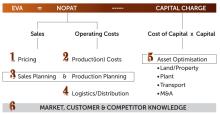It might be a cliché, but if you want your aggregates business to survive, you are going to have to find out how to get the right goods to the right place at the right time ... and all at the right cost. If you don't, and your transport and distribution strategy is wrong, you are going to be put out of business. It is all about logistics, an area in which the aggregates industry is often found wanting. We seem to forget to account for things like road tolls, bridge weight limits, traffic congestion or wait times at the quarry. It is time to stop subsidising your customer and/or your logistics provider and boost your own bottom line and company value. Join our experts from Commercial Performance to find out why logistics is so important.
The Oxford English Dictionary defines logistics as “the commercial activity of transporting goods to customers.” Professor Alan Waller, former president of the Chartered Institute of Logistics and Transport and a visiting fellow at Cranfield School of Management, once defined logistics as “the time-sensitive placing of resources.”
However you define it, logistics is a vital part of your company’s activity …a real driver of success or failure. In a recent study, it was shown that only 2% of pricing quotes generated by aggregates companies were correct. Astonishingly, 92% of the quotes studied were under-charging the customer.
This is bad, and it gets worse ... much worse. Logistics is a key part of the equation that our industry is getting wrong, over and over again. How do we perform and evaluate logistics in the aggregates industry, and where does it fit into our Six Deadly Sins theme of “not destroying the value of your aggregates business"? This article is not an in-depth look at logistics per se. It is, instead, a think piece focused on looking at the ways in which we quote for logistics, and the impact this approach will have on your company profitability and long-term value creation. It is a tactical look at how we leave money on the table, effectively subsidising (often to a surprisingly large extent) either the customer or the logistics provider … sometimes we are inadvertently putting money into the pockets of both!
Logistics is an important factor in driving up value creation, customer experience and customer profitability. The different operating models for logistics, such as whether you own your delivery vehicles or you lease, rent or sub-contract them has a major impact on your balance sheet, your P&L or any other financial metric that you use. And don’t just think about the financial implications of a well-run logistics organisation … think about your logistics provider as the person who has the most frequent contact with your customers. The delivery person is the face of your company out in the real word. So, the old cliché of on time, at the right price and with the correct quality sits firmly in the logistics camp.
Logistics is not just about cost, it is also all about revenue. In our experience, aggregates companies are quite poor at reconciling both, which is very worrying when you consider that the logistics accounts for 20% to 50% of the delivered cost of the average aggregates product. So … here is how you should track and reconcile your logistics cost …







